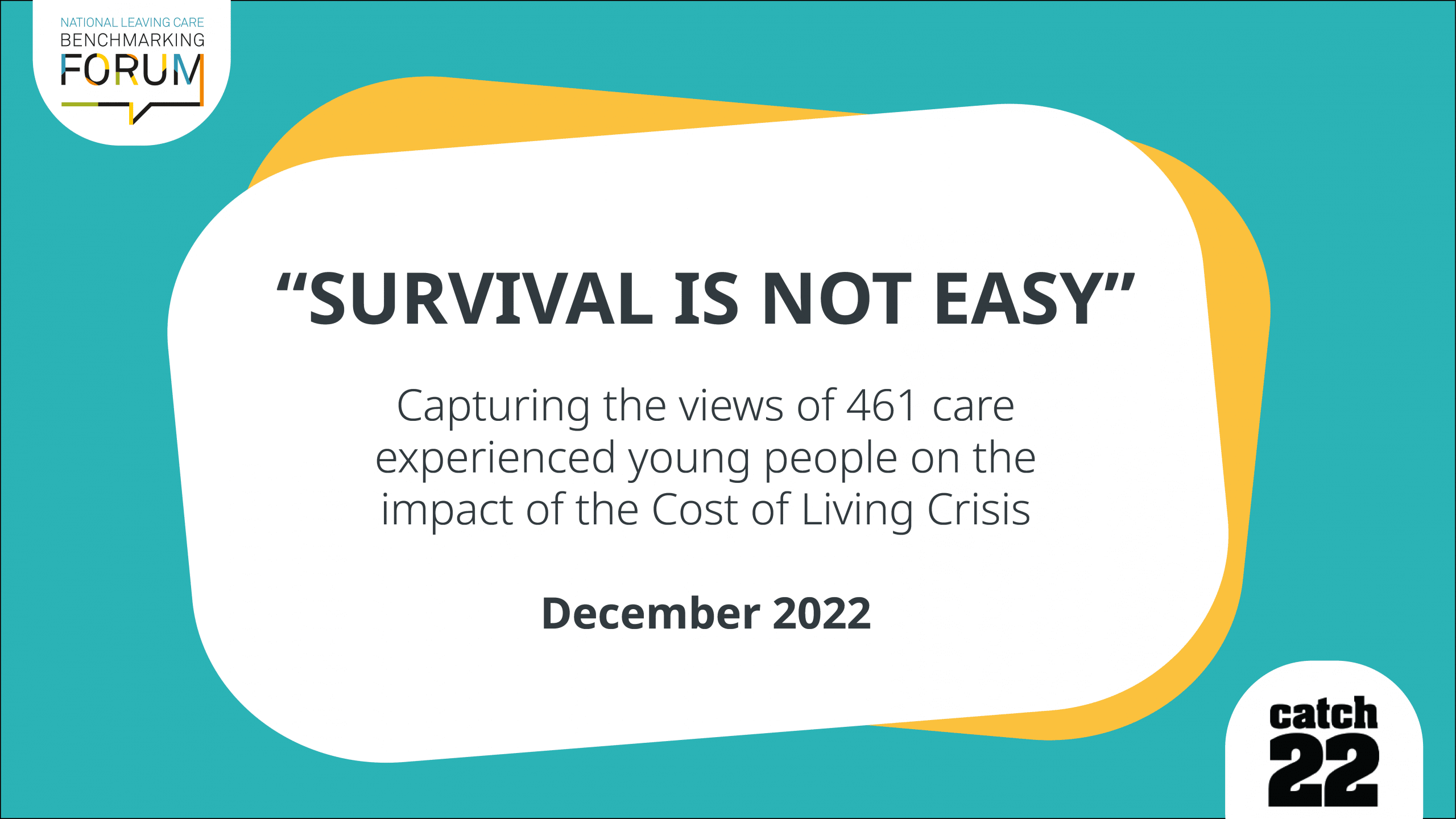NLCBF’s new Cost of Living report Survival Is Not Easy paints a stark picture of the crisis that care experienced young people are currently facing. The report shows the crisis is impacting mental health, housing security, ability to purchase food & essentials and young people are facing increasing levels of debt and are at increased risk of exploitation.
Over 460 care experienced young people, including many of our Young People’s Benchmarking Forum took part in the survey in the last two week of November 2022 and shared their experiences:
- 82% said they were struggling to afford food all or some of the time.
- 64% saw their levels of debt increase in 2022
- 76% recognise the cost of living crisis has impacted their mental health
- 31% said they were at risk of homelessness, due to getting behind with rent
- 14% had put themselves in a vulnerable position, such as shoplifting, to afford essentials.
This impact is being felt by young people in education, seeking work and in work – with one in three of people responding being full time workers.
Read the report Here: Survival Is Not Easy
“Food vouchers or help towards food costs would help. Going to food banks can be very embarrassing & it makes me feel in a vulnerable place.” Care experienced young person.
Worryingly, only 35% of young people report receiving additional support from their local authority. We are calling for each Local Authority to secure a ringfenced amount from their Household Support Fund allocation – Where this is happening, leaving care teams are able to support young people in a more proactive way, for example offering regular support with energy and food bills for young people living independently.
“I struggle day to day and it is quite worrying. My bills are so high, I live alone and have little in terms of support.” Care experienced young person
Financial wellbeing is key to young people’s success in all areas including engaging with education, employment, maintaining friendships and positive mental health. As we work towards the five missions for care experienced people in the Care Review, financial wellbeing will be critical to all of these.
For those young people on Universal Credit, £61.22 per week is simply unaffordable to live on and we are calling for an immediate commitment to make care experienced young people entitled to the over 25 Universal Credit rate as soon as they turn 18. This will benefit those in education, seeking work and in low paid employment.
Given the numbers of young people who are struggling significantly despite being in employment, we need to see additional support released immediately – in the form of ring-fencing part of each local authority’s Household Support Fund and in securing discounts on transport and utility bills which will reduce a young person’s outgoings.
While the cost of living crisis is impacting everyone, care experienced young people are particularly at risk, with only 15% of people taking our survey saying they had regular support from family or friends.
We are extremely concerned about the immediate situation young people are in and the long-term impact this will have on their wellbeing and aspirations.
Recommendations for Local Authorities:
- Secure ringfenced money from your Local authority’s Household Support Fund. This can be used in a planned way to help young people who are managing their own household bills.
- Increase contact with young people, like during the time of Covid – Assume a significant number of young people are having additional or exacerbated issues with paying for food and essentials, debt, housing, mental health & risks of exploitation. Be proactive about identifying & addressing these issues with partners.
- Promote all the support available in your area – including warm hubs & increase advice around budgeting, managing energy & cooking.
- Commit to increasing all financial support in the Local Offer in line with inflation E.g. HE Bursary, Setting up Home Allowance
- Identify a ‘Hub’ young people can come to for activities – To do washing and cooking where possible.
Recommendations for Government:
- Universal Credit – Make all care leavers eligible for the over 25 Rate Universal Credit from the age of 18, recognising that they are financially independent and often managing household bills.
- Issue guidance to Local Authorities to ringfence part of the allocated Household Support Fund for care experienced young people. Clearly young people are not accessing the support that is available & we need to take proactive steps to address this
- Identify financial wellbeing as critical to the success of the Care Review’s ‘Five Missions for Care Experienced Young People.’
- Launch a Universal Basic Income Pilot for young people leaving care & monitor outcomes. This is being piloted in Wales & offers young people sufficient money to live on as they leave care.
Recommendations for Care Leaver Covenant:
- Universal Discounts – Reduce outgoings for young people leaving care through universal discounts to travel and utility bills.
Read the full report and our recommendations Here: Survival Is Not Easy
We would like to say a huge thank you to the care experienced young people who shared their views to make this report possible. We’d also like to thank Coram Voice, Become, Care Leavers National Movement and Just for Kids Law who shared the survey with young people they support.
View Young Person's hub